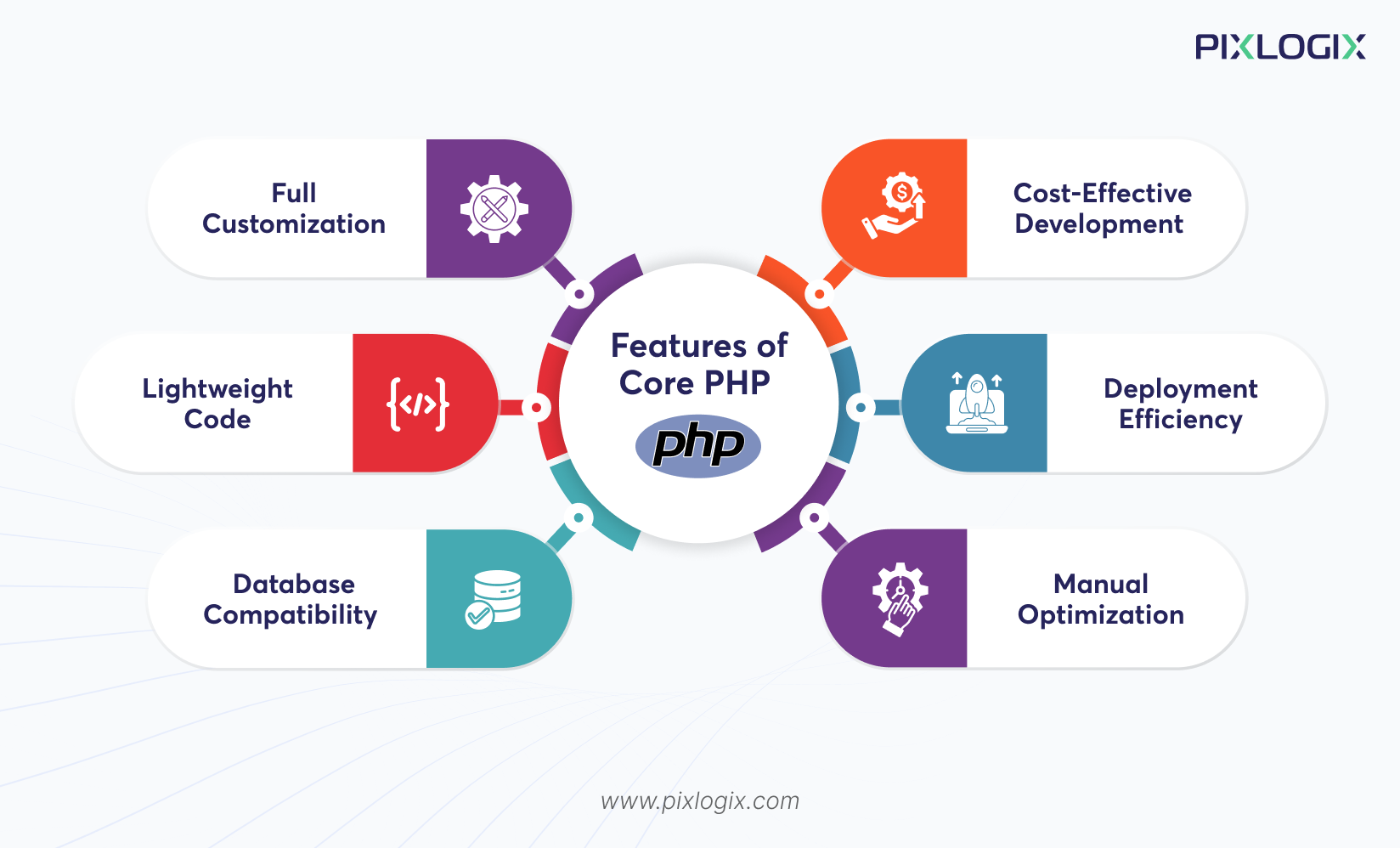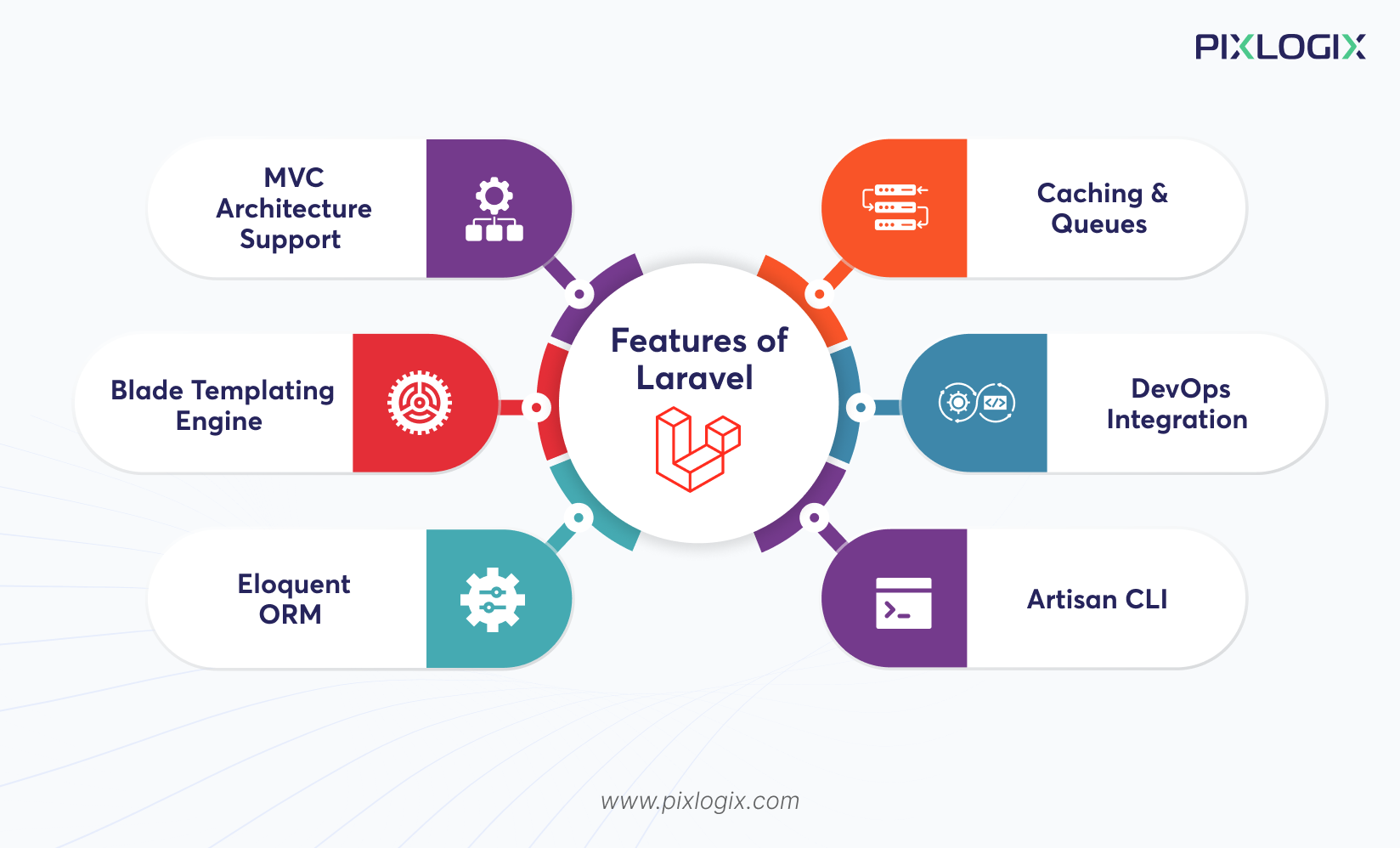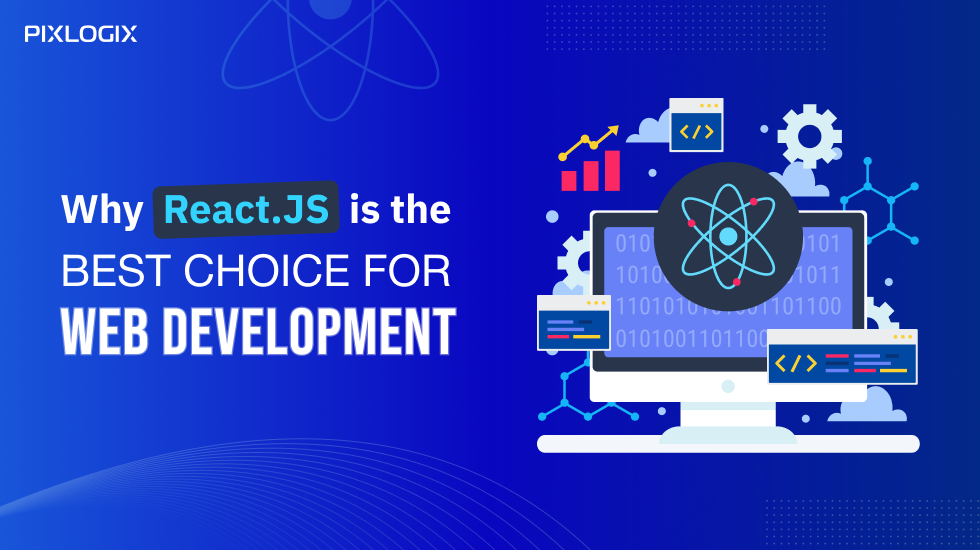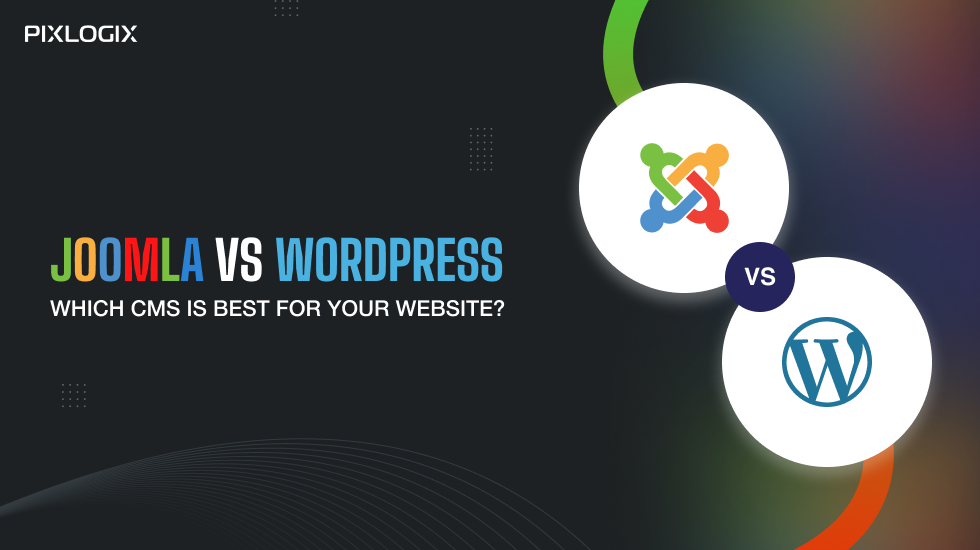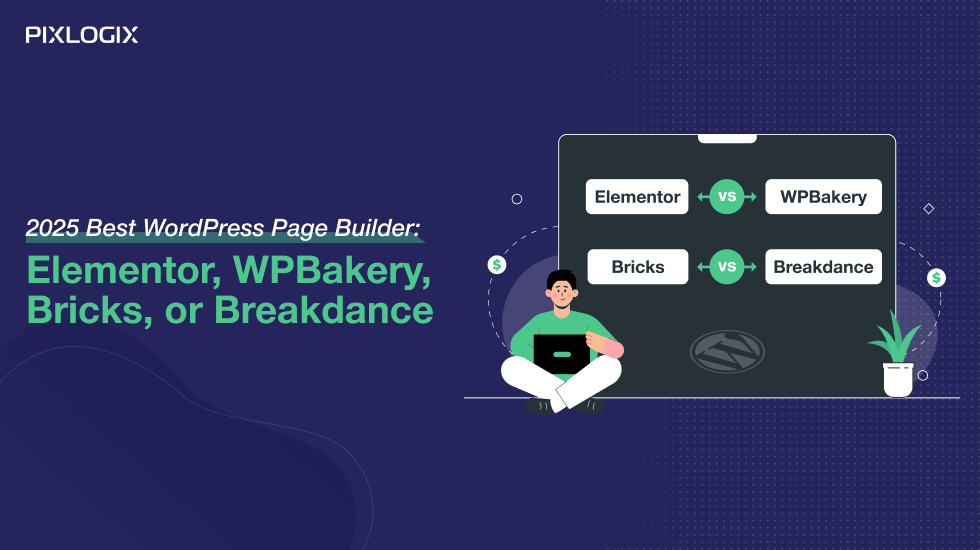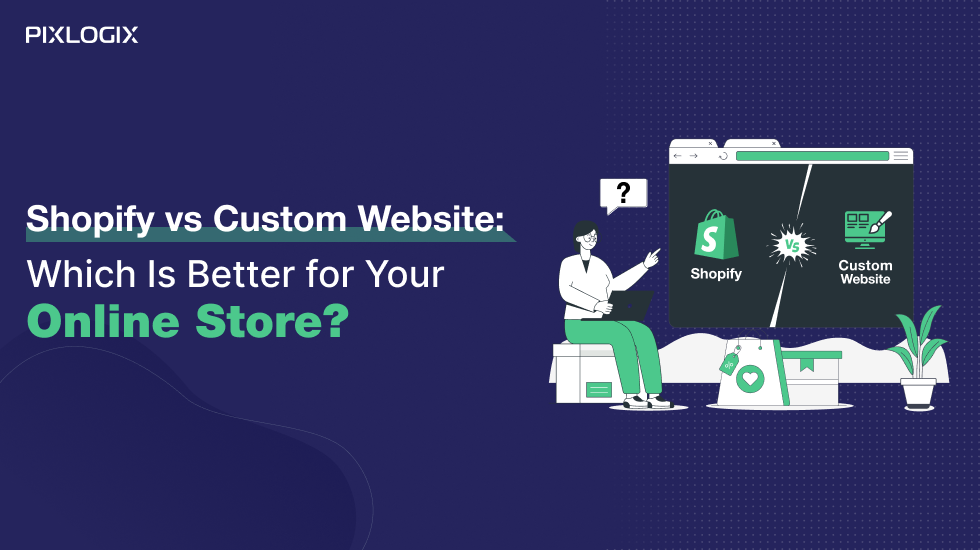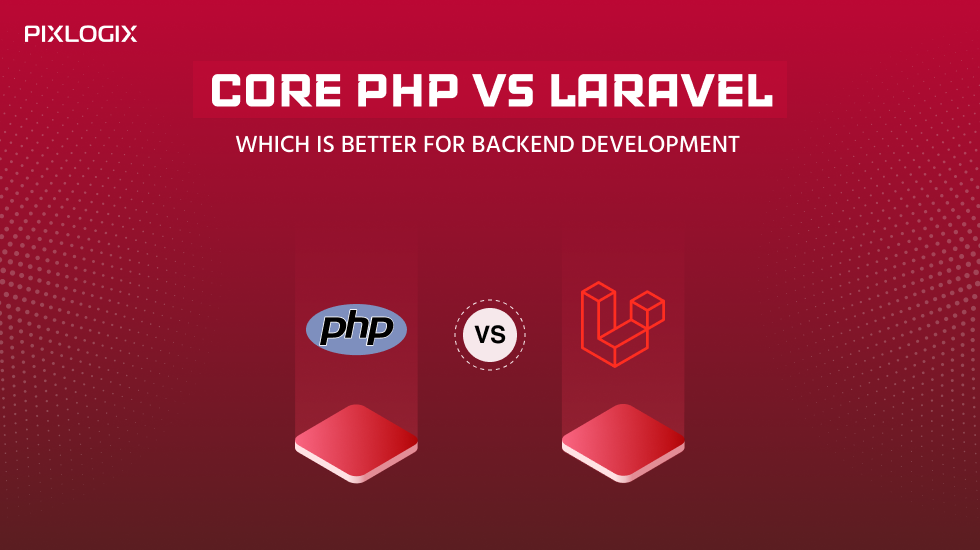
With so many available frameworks, developers are now finding it hard to pick the right tool. Yet it’s one of the most important steps in web application development. Today, Laravel and PHP have gained huge traction amongst IT leaders. Here, PHP stands as the most dominant backend language. W3Techs reveals that around 79% of websites all over the world are using it to manage server-side operations. This data proves its continued relevance in our hyper-digital world. Meanwhile, Laravel is a popular PHP framework. It is highly preferred for building scalable web applications.
Overall, selecting between Core PHP and Laravel is a strategic business decision. But what to choose? Which one will deliver higher ROI and support long-term sustainability? First, assess the key differences between Laravel and Core PHP. Then, pick the right tech stack that matches all your project and business needs.
Still confused about choosing between them? This blog breaks down the unique features of both PHP and Laravel development services in India. These insights will help you decide which one fits your business software needs.
What is Core PHP?
Core PHP refers to the base language of PHP without adding any frameworks. It enables developers to write server-side scripts from scratch. Also, it gives complete control over the logic, structure, and flow of the code. Core PHP automates intricate technical tasks in web application development services. It works seamlessly with HTML and other databases like MySQL and MariaDB.
Since it’s flexible, it can increase complexity in large-scale and collaborative projects. If you want to unlock the true potential of PHP? Then partner with a reliable PHP development company in India. They’ll help you write an optimized, secure, and scalable backend logic.
Features of Core PHP
● Full Customization
Developers enjoy complete freedom to build and fine-tune custom logic.
● Lightweight Code
It is designed with a lean structure, which ensures faster execution.
● Database Compatibility
Core PHP connects easily with MySQL and other databases.
● Cost-Effective Development
Ideal for businesses seeking budget-friendly backend development services.
● Deployment Efficiency
Can run on almost any server, ensuring broad market readiness.
● Manual Optimization
Developers often perform catching and optimization manually to improve performance. But it demands greater technical precision and regular maintenance.
What is Laravel?
Laravel is basically referred to as an open-source PHP framework. In 2011, Taylor introduced it to make web development faster and more efficient. Plus, it follows the MVC pattern to keep code clean and organized. Laravel always focus on separating business logic from presentation. It helps them improve code maintainability.
Laravel uses a clean syntax, which makes coding simple. Also, it can handle routing, sessions, and template rendering. All these key features of Laravel development services in India reduce repetitive coding tasks. Overall, Laravel is a developer-friendly framework.
Features of Laravel
● MVC Architecture Support
Maintain the code better by using the separation of methods.
● Blade Templating Engine
Helping developers to create reusable and dynamic layouts quickly.
● Eloquent ORM
Manage database relationships with simple and readable syntax. Some of them are hasOne, hasMany, belongsTo, etc.
● Caching & Queues
Offers integrated caching systems and background job queues. It enhances performance and handles heavy workloads.
● DevOps Integration
Laravel’s Forge and Envoyer make development, scaling, and server management easier. It uses tools like Nova to streamline backend administration.
● Artisan CLI
Automates repetitive tasks to boost business productivity.
Differences Between Core PHP and Laravel
Since Laravel is a part of PHP, you might doubt–what’s the exact difference between them? In general, both differ only in their functionalities. The table below compares these frameworks by highlighting their key features.
| Features | Core PHP | Laravel |
|---|---|---|
| Structure | Core PHP is an unstructured base language. It offers full control but requires developers to create custom architecture. | Laravel is a modern PHP framework with a ready-made structure that accelerates development and deployment. |
| Flexibility | Core PHP allows developers to freely build and structure applications as needed. | Laravel is highly flexible within its MVC framework, providing standardization while allowing customization. |
| Security | Core PHP requires developers to manually implement security measures. | Laravel includes built-in security features such as CSRF protection, encryption, and authentication. |
| Ease of Adoption | Core PHP can be more challenging for beginners due to its lack of predefined structure and organization. | Laravel simplifies learning with rich documentation and a structured approach that makes onboarding easier. |
| Maintenance | Core PHP applications often require more maintenance due to inconsistent coding practices and lack of conventions. | Laravel encourages clean, modular code that’s easier to maintain, update, and scale over time. |
| Compatibility with Database | Core PHP gives full control over database queries, but developers must handle connections manually. | Laravel’s Eloquent ORM simplifies database interactions with a clean abstraction layer for managing queries and relationships. |
| Functioning | Core PHP is best suited for small-scale projects requiring basic scripting. | Laravel comes with built-in tools for routing, authentication, and session handling—streamlining complex development tasks. |
| Performance & Scalability | Core PHP loads faster for small websites but requires manual optimization and caching. | Laravel supports large-scale applications with advanced caching (Redis, Memcached), job queues, and service container architecture. |
| Ecosystem Support | Core PHP requires manual or third-party setups for deployment and maintenance. | Laravel offers official tools like Forge, Envoyer, and Nova for simplified deployment, monitoring, and management. |
Now, analyze this comparison between Core PHP and Laravel. And pick the platform that perfectly suits your long-term business goals.
When to Use Core PHP?
When to Use Core PHP? Core PHP is ideal for smaller and highly customize projects. It enables you to take full control of your code. Here’s where to use Core PHP:
Small Websites or Scripts
Core PHP works perfectly for basic sites such as personal blogs and simple landing pages. For example, a local restaurant website with simple menu bars doesn’t need a complex Laravel.
Learning PHP Basics
Core PHP is a great tool for beginners. It allows you to write every code from scratch, which makes learning simpler.
Custom Solutions
It’s an excellent choice for one-off or highly specific tasks. For example, creating a small CSV processing script is quicker without a framework.
Cost-Effective Projects
If you have budget constraints and tight deadlines, then choose Core PHP. It saves the setup time and limits infrastructure costs. This makes it a practical choice for small tasks.
Low-Resource Environments
Core PHP runs efficiently on shared hosting or minimal servers. This makes it suitable where framework overhead isn’t affordable.
When to Use Laravel?
Laravel is perfect for complex, feature-rich projects where speed and security matter. It stands out in scenarios like these:
Web Applications
Laravel is great for building full-featured apps. This includes e-commerce stores or SaaS solutions. Laravel’s built-in tools ease the process of managing online stores.
APIs and Mobile Backends
It simplifies building APIs for mobile apps or third-party integrations. With features like API authentication, you save time and reduce boilerplate code.
Team Projects
Laravel’s organized MVC structure makes collaboration smooth. Multiple developers can work together without confusion, keeping code clean and manageable.
Security-First Apps
Laravel’s built-in protections are helpful for healthcare portals and banking systems. Its CSRF tokens and encrypted sessions help minimize risks.
Performance-Oriented Systems
Laravel’s cache drivers and queue management features ensure stable performance. Its load-balancing and horizontal scaling capabilities make it ideal for enterprise systems.
The Future of Laravel and Core PHP
As of 2025, Laravel 11 introduces cleaner directory structures, improved type safety, and enhanced queue management. It also supports integrations with AI-based APIs and microservices. This makes it suitable for building smarter applications.
Meanwhile, PHP 8.3 and the upcoming PHP 9 versions simplify syntax. These updates keep it relevant for lightweight projects as they need only minimal setup.
In short, both technologies will coexist. Laravel supports large-scale digital ecosystems. Meanwhile, Core PHP is for compact or utility-based solutions.
Conclusion
Both Core PHP and Laravel have distinct advantages. It works based on your project goals and technical resources. Core PHP development services offer complete flexibility. And it gives you full control over custom-built solutions. Use it for blogs, portfolios, or custom scripts where speed and minimal setup are important.
Meanwhile, Laravel development services in India are highly preferred for complex projects. It brings structure, scalability, and security to intricate business applications. This makes it a better choice for developers seeking high-level solutions. Now, analyze your business needs, outline them, and match them to choose the right framework.
Ready to build your next web project? Then team up with a reliable PHP development company like us. We at Pixlogix are a group of agile developers helping you build secure, scalable, and high-performance web applications. Connect with us today to explore our tailored backend development services.
Samir Bhimbha is the Founder & CEO of Pixlogix Infotech Pvt. Ltd. which offers web and app solutions to fulfill business's online needs and help to improve their online presence with many clients in the USA, Europe, Australia, and more. He is a skilled entrepreneur, web designer, developer, and team leader who can handle every situation. With 15+ years of experience in UX/UI design and web development, he is leading a team of IT professional talents.
Related Post

Get in Touch Now!
Have a word with our expert consultants about your next project to get suggestive guidance & proposal.
Sales Inquiry
HR Inquiry
India’s First SOTD Winner on Awwwards.com – 2010

